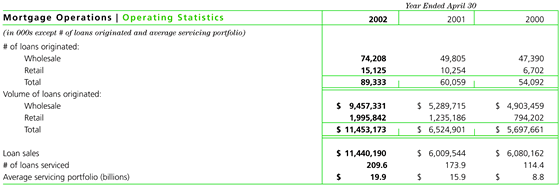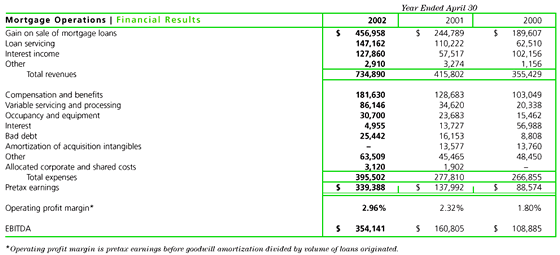MORTGAGE OPERATIONS
Through Option One Mortgage Corporation and H&R Block
Mortgage Corporation, this segment offers a wide range of
home mortgage products. This segment is primarily engaged
in the origination, servicing and sale of nonconforming and
conforming mortgage loans. This segment offers a flexible
product line to borrowers who are creditworthy but do not
meet traditional underwriting criteria, through a network
of mortgage brokers. Conforming mortgage loan products, as
well as the same flexible product line available through brokers,
are offered through some H&R Block Financial Advisors
branch offices and H&R Block Mortgage Corporation retail
offices.
A primary
source of revenue for this segment is the recognition of gains
on sales of mortgage loans. This segment also holds residual
interests in securitized mortgage loans in which cash flows
are received over the life of the loans. The subsequent securitization
of these residual interests in the form of a net interest
margin bond (“NIM”) results in the receipt of
a substantial portion of the cash from the residual at the
closing of the NIM transaction, rather than over the actual
life of the loans.
During
fiscal 2002, the Company’s residual interests performed
better than expected primarily due to lower interest rates,
as well as lower loan losses and prepayments to date than
originally projected in the valuation models. The lower rates
reduced the interest payments to the bondholders, thereby
allowing the bondholders and residual interest holders to
receive cash related to principal and interest payments, respectively,
earlier than expected in the valuation models. As a result
of these items and in accordance with Statement of Financial
Accounting Standards No. 115, “Accounting for Certain
Investments in Debt and Equity Securities,” the Company
recorded pretax mark-to-market write-up adjustments in the
fair value of its residual interest of $151.1 million during
fiscal 2002. These write-ups are recorded, net of deferred
taxes, in other comprehensive income and are then accreted
into income throughout the remaining life of those residual
interests. Future changes in interest rates or other assumptions
could cause additional adjustments to the fair value of the
residual interests and would cause changes to the accretion
of these residual interests in future periods.
One of
the Company’s core strategic objectives is creating
a financial partnership with its tax clients through delivery
of advice, coupled with the products and services needed to
act on that advice. The Company’s initiative to serve
the mortgage needs of its tax clients through its retail mortgage
operations resulted in 43.2% of all retail loans, and 7.3%
of all loans originated during fiscal year 2002, coming from
H&R Block tax clients, compared to 29.4% and 5.0%, respectively,
in fiscal year 2001.
Management utilizes operating profit margin to evaluate this
segment’s performance. Operating profit margin is defined
as pretax earnings before goodwill amortization divided by
volume of loans originated.


Fiscal 2002 compared to fiscal 2001
Revenues increased by $319.1 million or 76.7%, to $734.9 million,
for the year ended April 30, 2002 compared to the previous
year. The increase is primarily due to an increase in production
volume, higher interest income, a favorable secondary market
environment and a larger servicing portfolio.
Revenues
related to the sale of mortgage loans increased by $212.2
million or 86.7% to $457.0 million over the prior year resulting
from a significant increase in loan origination volume and
better pricing execution on mortgage loan sales. During fiscal
year 2002, the Company’s loan origination volume increased
75.5% over last year. The increase in loan production is a
result of an increase in the average loan size, an increase
in the size of the sales force, an improvement in the closing
ratio and to a lesser extent, the declining interest rate
environment. The average loan size increased to $128 thousand
from $109 thousand in fiscal 2001 and the closing ratio improved
to 50.3% from 44.9% in the prior year. The total execution
price for fiscal year 2002 was 4.30% compared to 3.71% for
last year. The execution price is defined as the total premium
received divided by the total balance of loans sold. The better
execution price is partially attributable to the declining
interest rate environment that has the effect of widening
spreads on mortgage loan sales, as well as better structuring
of the deals. Somewhat offsetting the increase in the gain
on sale were losses of $31.0 million that were recorded in
2002 related to adverse changes in the timing and amount of
cash flows on certain residual interests.
Servicing
revenues increased $36.9 million to $147.2 million for the
year ended April 30, 2002 as compared to the same period last
year. The increase reflects a higher average loan servicing
portfolio balance. The average servicing portfolio for the
twelve-month period increased 25.2% compared to the same period
last year.
Interest
income for the year ended April 30, 2002 was $127.9 million,
an increase of $70.3 million or 122.3% over the prior year.
This increase is primarily the result of the declining interest
rate environment, which improves the excess retained interest
spread earned. The excess retained interest spread for fiscal
year 2002 was 5.58% compared to 2.65% for last year. Also
contributing to the increase in interest income is higher
accretion income on residual interests during fiscal year
2002.
Pretax
earnings increased $201.4 million or 146.0%, to $339.4 million
for the year ended April 30, 2002. The improved performance
is primarily due to the increase in revenues as discussed
above. In addition to higher loan volumes, improved closing
ratios and focus on operating efficiencies helped drive a
decline in the net cost of origination. The increase in compensation
and benefits is due to an increase in the number of employees
supporting the increase in volumes. The increase in variable
servicing and processing expense is due to the increase in
the size of the servicing portfolio and a $11.6 million write-down
of mortgage servicing rights (“MSRs”) and other
servicing related assets recorded in fiscal 2002 to reflect
a change in the assumptions underlying the related loan portfolios.
The year ended April 30, 2002 also benefited by $13.6 million
in reduced goodwill amortization compared to the prior year
from the adoption of SFAS 141 and 142. |